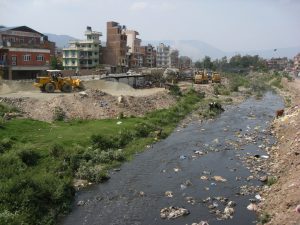As global temperatures climb higher, the earth is approaching tipping points that threaten human security, leading scientists – including social scientists – have warned during the UN climate summit in Bonn.
The warning comes as global greenhouse gases (GHG) emissions are projected to rise after three stable years. GHG emissions – mainly carbon dioxide – are warming the earth’s atmosphere, leading to more frequent and more severe floods, storms and droughts, and rising sea levels.
“There is no room for complacency. Climate change is here. It is dangerous. And it is about to get much worse,” said Johan Rockström, executive director of the Stockholm Resilience Centre and Chair of the Earth League – an international network of scientists. “In the last two years, evidence has accumulated that we are now on a collision course with tipping points in the earth system.”
The statement was delivered as the “10 science must knows about climate change” to Patricia Espinosa, executive secretary of the UNFCCC and negotiators in Bonn. Published by Future Earth and the Earth League, the statement summarises the findings of recent earth-system science and economic research.
The 10 science must knows about climate change
Much evidence suggests that the planet has entered a new geologic epoch — called the Anthropocene. The rate of change of the earth system is accelerating as a result of humans’ impact on the planet’s biology, chemistry and physics. The Earth’s climate has been remarkably stable since before the dawn of civilisation, but is now at risk
Earth is approaching critical “tipping points”. By crossing these thresholds, the planet may see abrupt – and possibly irreversible – shifts in the workings of the Arctic, Amazon and other parts of the globe
The record-breaking Atlantic hurricane season this year provides a glimpse at the increased risks of extreme weather events that the planet may experience in the future. These events include severe flooding, heat waves and droughts
Changes are occurring quickly in the ocean, with accelerating sea-level rise and ocean acidification
The economic costs of climate change are already being felt, and some of the world’s poorest nations are bearing the heaviest burden
Climate change will have a profound impact on human health by placing new pressures on food and water security in nations around the world.
Climate change is likely to exacerbate migration, civil unrest and even conflict. In 2015, more than 19 million people worldwide were displaced by natural disasters and extreme weather events. Climate change will likely cause that number to grow.
The world needs to act fast. If humans continue to emit greenhouse gases at current rates, the remaining carbon budget to reduce the risk of exceeding the 2 degrees Celsius target will be exhausted in around 20 years. Emissions should peak by 2020 and approach zero by around 2050 if the world is serious about reducing risk. As a simple rule of thumb, this means halving global emissions every decade.
A fossil-fuel free society is economically attractive. Renewable energy sources increasingly compete with fossil fuels, even when these are priced at historic lows. Moreover, the estimated costs of inaction ranges between 2-10% of GDP by 2100 by some estimates, to a fall in projected global output by 23% in 2100 in others.
Even if the world meets Paris Agreement targets, communities across the globe will still need to build resilience and adapt to the changes already under way.
Worried scientists
“The news that emissions are rising after a three-year hiatus is a giant leap backwards for humankind,” said Amy Luers, executive director of Future Earth. Pushing Earth closer to tipping points is deeply concerning. Emissions need to peak soon and approach zero by 2050. Fortunately, we now have the tools to transition to a low carbon world while increasing energy security, improving human health and strengthening economies.”
Hans Joachim Schellnhuber, Earth League member and director of the Potsdam Institute for Climate Impact Research, added: “It is important to remind everyone of the very reasons why tens of thousands of people meet in Bonn: unprecedented risk to humanity due to global warming, as revealed by science.”
We want to hear from you! Tell us what you think about The Third Pole and you could win $100. Take our survey here.
![<p>PFC Raiquan Wade, of the South Carolina National Guard, clearing debris in Puerto Rico after Hurricane Maria [image by: The National Guard/SSG Mark Scovell]</p>](https://www.thethirdpole.net/content/uploads/2017/11/PFC-Raiquan-Wade-of-the-South-Carolina-National-Guard-clearing-debris-in-Puerto-Rico-by-The-National-Guard-SSG-Mark-Scovell-300x214.jpg)






